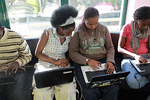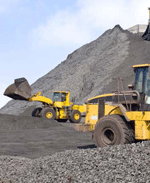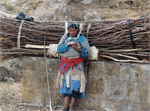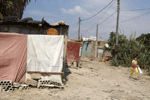Published on Wed, 2013-10-16 18:00
Huduma is an initiative of INFONET previously incubated at SODNET (Social Watch in Kenya), the United Nations Millennium Campaign and the African Institute for Health and Development (AIHD) that seeks to improve public service delivery through the strategic use of Technology. The strategy is coined within a logic of improving the capability of the state and that of an informed citizen to collectively improve service. While the state remains the largest provider or guarantor of services, the citizenry have a right and responsibility to engage in the improvement of such services. Huduma places in the hands of citizens, simple technology and media based tools and platforms to amplify their voices, while at the same time, improves the capacity for better responsiveness. |
Published on Wed, 2013-10-16 10:01
The decade-long economic expansion in Africa has not translated into improved conditions of living for ordinary Africans. Indeed, many Africans remained trapped in the circle of joblessness, material deprivation, poverty, insecurity, loss of livelihood and mining related environmental disasters. African governments challenged to reinforce ongoing fiscal reforms and mining contract renegotiations with other measures to improve the equity between state and investor in the booming extractive sector and also to finance the AMV in full. |
Published on Tue, 2013-10-15 17:00
With the richest one percent of the population now owning 40 percent of global assets, and the bottom half sharing just one percent, inequality is fast being recognised as a stubborn underlying obstacle to development. In recent decades, despite steady economic growth, inequality has risen in most countries and in nearly every region of the world. It takes various forms, from income gaps to unequal political access. And it originates in a variety of factors, such as gender, ethnicity, disability, legal status, caste, skin colour, language and economic status. |
Published on Mon, 2013-10-14 23:00
On October 17 2013, the International Movement ATD Fourth World will host the commemoration of the International Day for the Eradication of Poverty at United Nations Headquarters. The first celebration was in 1992, when the United Nations declared October 17th the International Day for the Eradication of Poverty. For the last two decades, this day has promoted understanding between people living in poverty and the society at large. The theme for this year will be “Working together towards a world without discrimination: Building on the knowledge of people living in extreme poverty.” One of the most painful aspects of a life in poverty is the discrimination faced by people on a daily basis; their marginalization in the political, economic, and social spheres of their societies, and their lack of voice and representation in the conceptualisation, implementation and evaluation of policies and programmes that affect them directly and indirectly. |
Published on Thu, 2013-10-10 14:29
One cannot discuss policy priorities and challenges in Lebanon without first addressing the dangerous developments the region is currently experiencing. Oppression, backwardness and the shortcomings of democracy in the region as a whole are serious hindrances that could turn the tide and reverse the more positive trends. Despite the challenges they raise, the current developments clearly demonstrate the potential for change in the region: people are no longer willing to stand idle in the face of tyranny, poverty, unemployment and marginalization. Lebanon is still facing the systemic challenges of the political confessional system. The state must be an institutional and constitutional expression of democracy and people’s rights. Genuine citizenship cannot be achieved without the rule of law, without a system that gives citizens their rights and duties towards both society and the state, which are also preconditions for an effective civil society. Thus the main obstacle to true citizenship in the country is still the partition of state offices and institutions among the different religious confessions. |
SUSCRIBE TO OUR NEWSLETTER







